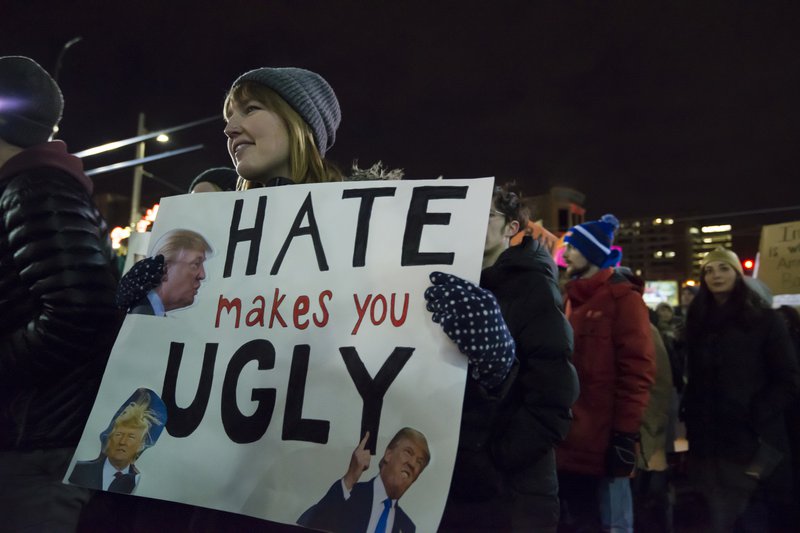When we allow ourselves to fall victim to hatred, we are doing our opponents’ work for them.
President Trump has already done great harm and will do a great deal more before he leaves office. Therefore, we must oppose him using all legal means. It is because we oppose him that we discourage hatred.

Our reasons are not based in religion or ethics but in strategy. Creating sound strategies depends on having an accurate assessment of your opponent or competitor. In his book The Art of War, the Chinese military strategist Sun Tzu said, “If you know the enemy and know yourself you need not fear the results of a hundred battles.” It was clear to Master Sun in 600 BC that you need to see your opponents clearly and assess them accurately. This is just as true today: crafting sound strategies requires the objective and unprejudiced analysis of your targets. Strong feelings of contempt or animosity hinder this analysis. Objectivity is crucial in opposition research because intelligence is required to predict and respond to another person’s actions.
If we wish to oppose someone effectively we should not allow ourselves to hate them. Hatred clouds our assessment and makes us less able to predict our opponents’ behavior. It encourages us to develop simplistic views and ignore the subtleties of the personalities and situation at hand. If we can develop a more nuanced and complex understanding we can predict people’s behavior more accurately. Unless we try to empathize with our adversaries we will never understand them, and this will put us at a disadvantage.
When we love someone, we often ignore or discount negative information about them. Conversely, when we hate them we tend to ignore the positives, thus reinforcing the well-known effects of ‘confirmation bias’ – the tendency to pay more attention to information that confirms our prior views than information that challenges them. For example, the United States initiated the second Iraq war in the mistaken belief that Saddam Hussein had weapons of mass destruction. President George W. Bush was too ready to believe questionable intelligence on this topic, in part because he had such personal animosity towards Hussein, who had threatened to kill his father, George H. W. Bush.
From our partners:
As we become more entrenched in such views we become even more resistant to information that contradicts them, a process known as the ‘backfire effect. ’And as our commitment to misinformation escalates, we become willing to invest more and more resources in defending our mistakes. The Vietnam War is an example of escalating commitment to a failing course of action. The ‘Sunk Cost Fallacy’ is the term economists use to describe the tendency to invest more resources in bad projects just because we have already invested in them, or to ‘throw good money after bad.’
At the extreme, hatred harms us mentally, emotionally, and physically. It clouds our judgments, sours our dispositions, and upsets our stomachs. Therefore, it weakens us and helps our opponents. When we let ourselves fall victim to hatred, we are doing our enemies’ work for them.
Trump’s own business career illustrates the harmful effects of indulging in hatred in this way. His book Think Big contains a chapter entitled “Revenge” in which he revels in the suffering he has caused his enemies and the pleasure revenge has brought him. But in fact his hatred has actually hurt his business judgment, causing him to over-pay for real estate in order to beat out his rivals and alienate potential business allies through his bullying and tantrums. When Trump taunts and slanders his opponents he is encouraging them to weaken themselves by hating him, since in the process they become less formidable. So when either of us feels hatred for the President we remind ourselves of these facts:
– Trump has no real friends and cannot really love his wife and family. He is alone in a way that people who genuinely love other people cannot fully understand.
– His desire for wealth and attention is insatiable. Therefore, he will die dissatisfied and confused.
– Now that he is President, his past criminal activities and associates are being investigated. For the remainder of his life he will be dealing with the legal consequences of his past misdeeds.
– Because he acts capriciously and maliciously, most of what Trump does has negative consequences. Although he is a multi-billionaire and holds the highest office in the land he is living in a hell of his own making.
In short, Trump is a pitiable man. He is harming others so we must oppose him, but we can do this more effectively if we realize how sad his life is. Pity is an unpleasant emotion, but it is better to feel pity than hatred, especially when it can be transformed into compassion, an active desire to help another person. Compassion can be cultivated through practices like loving-kindness meditation and consciously refusing to malign and slander those with whom we disagree, even as they may malign and slander you.
We are not saying that people need to love Donald Trump – merely that we should try to stop hating him. When we learn about another of his hateful actions or statements it is only natural to feel momentary disgust and anger. However, we should not allow this momentary feeling to grow into enduring enmity. Instead, we should use whatever techniques and practices work for us to cultivate equanimity. Once we are calm, we can work against him with renewed focus and determination.
Perhaps the best way to keep from indulging in hatred of Trump is to maintain our focus on what we are doing to oppose him and reduce the damage he is doing. That’s the strategy we’ve adopted ourselves. When either of us notices feelings of enmity we redirect our attention to the actions we are taking, whether it’s how to allocate our limited resources to Democratic candidates in toss-up races for the House of Representatives or signing petitions to oppose some of Trump’s most egregious policies. We may not be able to do much directly but we can all help a little in reducing the harm Trump is doing and repairing the social fabric that he is tearing to pieces.
Instead of hating Trump, we should oppose him in a spirit of compassion, since that will help to ensure that we do so in the most effective ways. If we can minimize the damage he does in office and remove him as soon as possible we will be helping him as well as everyone else on this planet. Once Trump does leave office the rest of us will have a world of work to do in dealing with the climate of hatred and mistrust he has fostered.
“Hasn’t Trump done hateful things? Doesn’t he hate people like us who oppose him? Why shouldn’t we hate him?” The answer to the first two questions is, “yes.” The answer to the last question is, “He wants you to hate him.” So if you want to oppose him successfully, please don’t do it.
Susan L. Rhodes And Charles R. Schwenk
This article originally appeared in openDemocracy.














